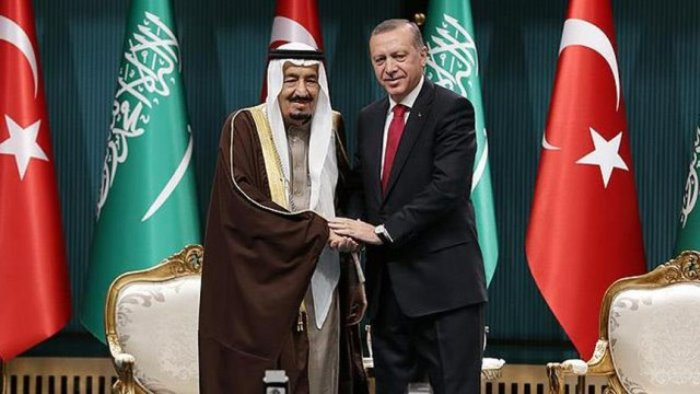The Limits of Turkey’s Double Game

This week, in the aftermath of repeated Iran-bashing statements by the Turkish President and his foreign minister, the Turkish ambassador in Tehran was summoned to register his hosts' strong displeasure. "We will be patient with their positions. But there is a cap for our patience," the Iranian Foreign Ministry Spokesperson Bahram Ghasemi has been quoted in the media.
The big question is, of course, what is behind such negative statements, echoing the wild accusations of Iran's chief nemesis in Persian Gulf, i.e., Saudi Arabia, by the Turkish officials who, simultaneously, publicly boast about their trilateral cooperation with Iran and Russia on Syria peace talks? Notwithstanding the on-going Astana talks that hinge on the sustained cooperation of these three powers, torpedoing the peace process by joining the anti-Iran regional alliance makes no sense whatsoever from the prism of Turkey's own national interests, seeing how the Syrian conflict has had unwanted spill-over effects on Turkey.
A feasible, though by no means convincing, answer to the above question is that Turkey is acting opportunistically and wants to benefit from all sides, even if it means allowing smuggled oil from ISIS territory, as has been the case since 2014. But, appeasing Saudi Arabia, which has bankrolled some of the extremist jihadists in Syria, will only augment Turkey's own insecurity syndrome in the long run, no matter what the short-run gains in terms of likely Saudi financial support for Turkey is. Hence, the Turkish government has to let the chips fall one side or the other and cannot possibly play its current double game without incurring substantial costs.
Needless to say, Ankara is playing fire with the longevity of hitherto solid Iran-Turkey economic ties, which is expected to grow substantially in the post-nuclear deal era. Yet, instead of focusing and investing energy on expanding those bilateral ties, Ankara is seemingly more interested now in toeing the Saudis' destructive line in the region, which has had calamitous results, such as by causing a humanitarian catastrophe in Yemen after two years of sustained bombardment of the poor country's entire infrastructure. Whereas Iran has repeatedly called for a cease-fire in Yemen, Turkey has refrained from throwing its weight behind the efforts to bring the Yemen conflict to an end, nor has Turkey ever sounded the smallest criticism of Saudi Arabia's, and Qatar's, funneling of support for the terrorists in Iraq and Syria. How, then, does Turkey expect anyone in Tehran or Moscow have faith in their partnership with Ankara for durable peace in Syria, particularly when Mr. Erdogan persists with his occasional diatribe against Damascus, which is tantamount to interference in Syria's domestic affairs?
Indeed, contrary to Erdogan, he has no right to determine the shape of Syria's future and he is partly to blame for the deadly conflict that was stimulated back in 2011 with Erdogan's blatant calls for regime change in neighboring Syria, arrogating to himself the role of king-maker. Despite the tsunami of setbacks for Turkey since then, e.g., its tourism industry victimized by rampant terrorism, Erdogan remains in a state of denial and seeks to maintain at least a zone of influence inside Syria, which is contrary to his official policy of promoting the peace talks and political reconciliation between Damascus and the opposition. Erdogan seems to be emboldened by the new Trump administration which is toying with the notion of a "safe heaven" for Syrian refugees inside Syria basically a ruse for American interventionism. Following his recent visit with the Director of CIA Mike Pompeo, who then immediately flew to Riyadh, likely to coordinate a US-led script for Syria, Erdogan seems captivated by the illusion that he can join the US-Saudi camp while co-sponsoring the peace talks. An impossibility indeed. That would be giving 'criss-cross' alliances a new, and thoroughly incoherent, meaning.
In fact, the anti-Iran statements of Erdogan and his foreign minister Mevlut Cavusoglu spotlight the inherent danger of future atrophy of Turkey's conflict-management role, reflecting a built-in ambivalence triggered by the pro-Saudi solidarity that in the end will only lead to the collapse of the present partnership with Russia and Iran, two key neighbors who also happen to be the main suppliers of energy to Turkey. Hopefully, a cold calculation of Turkey's national interests will cause an immediate re-thinking of this counterproductive and ultimately futile double game on Turkey's part, otherwise Ankara will face an even more inhospitable regional environment than is the case today.
* The views expressed in this article are the author's own and do not necessarily reflect Iranian Diplomacy's editorial policy.

